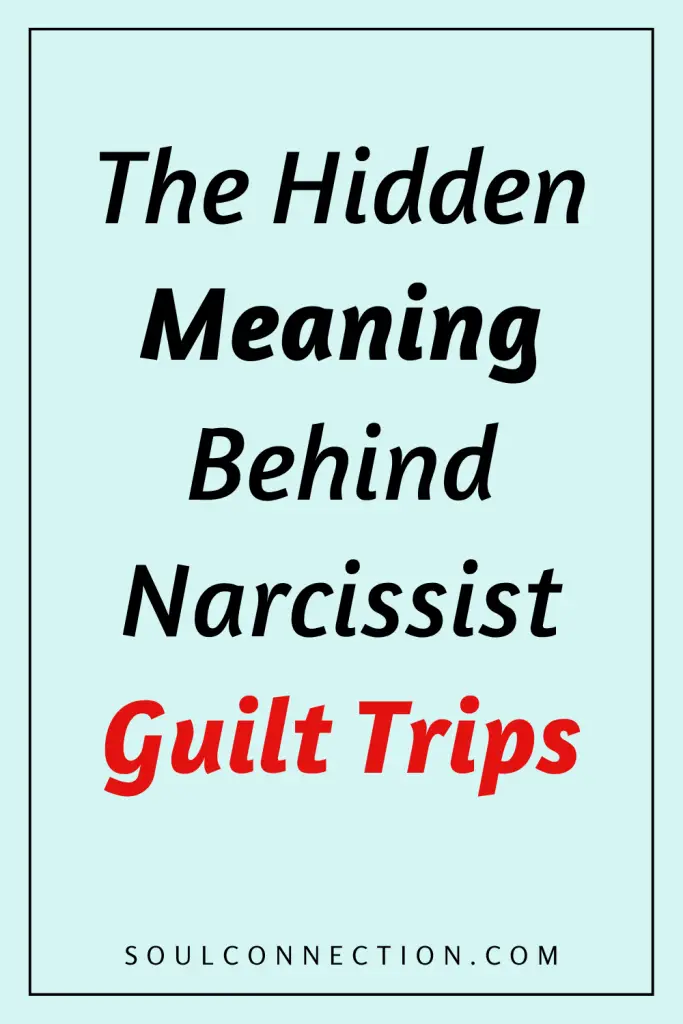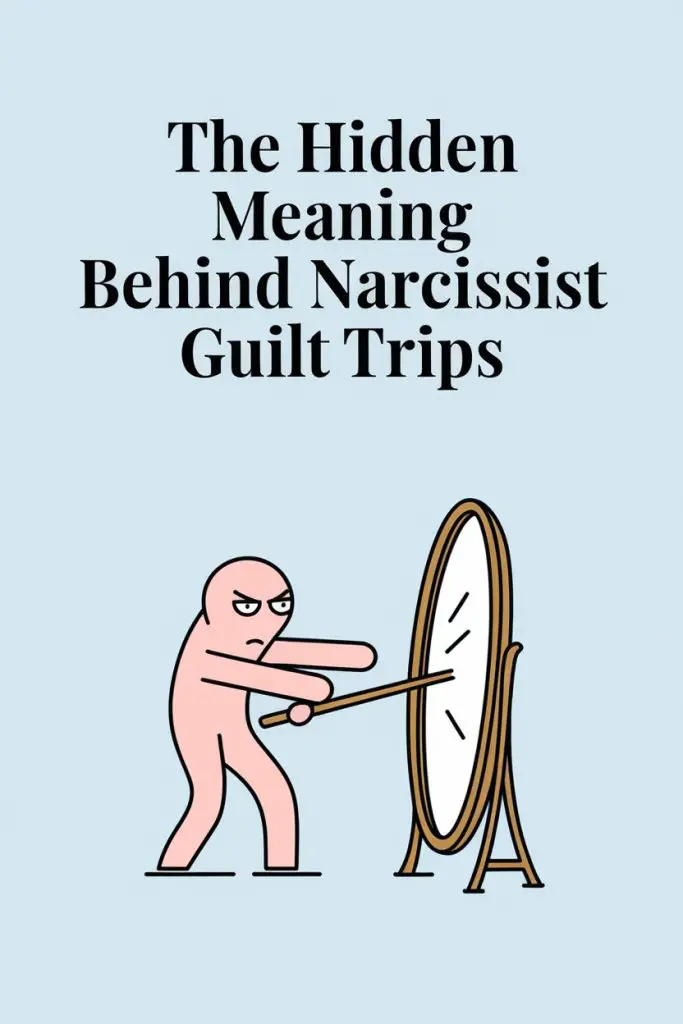Ever left a conversation feeling like you accidentally signed up for a guilt marathon—without ever knowing you were running? That might’ve had a narcissist cheering from the sidelines.
Guilt trips are a specialty of the self-absorbed, but there’s a lot more happening beneath the surface than a simple attempt to get you to do the dishes.
Why do narcissists love guilt trips so much? Is it just about getting their way, or is there a juicy psychological stew simmering underneath?
Let’s peel back the curtain, and maybe give you a few tools to keep your own conscience from being hijacked. Spoiler: You don’t have to hand over your emotional passport every time someone says, “After all I’ve done for you…”
The Anatomy of a Narcissist Guilt Trip
Guilt trips are to narcissists what a perfectly brewed cup of tea is to your nan: reliable, comforting, and always within arm’s reach. At their core, guilt trips are about control.
The narcissist’s sense of self depends on controlling perception—yours, theirs, everyone’s.
But here’s the kicker: these guilt trips aren’t clumsy or accidental. They’re served up with the precision of a surgeon.
A well-placed sigh, a carefully chosen “I guess you just don’t care,” or the Olympic-level sulking that follows when you dare say “no” to their request.
It’s not just manipulation for material gain. It’s a performance, one where you’re cast as the villain, even if you only asked for your charger back.
Underneath the act, there’s a frantic need for validation. The narcissist’s self-worth is a leaky bucket, and guilt trips are their go-to patchwork. If you comply or apologize, they feel powerful—briefly.
Why Narcissists Reach for the Guilt Card
A narcissist’s relationship toolkit isn’t exactly brimming with healthy, communicative gadgets. When self-reflection looks like a haunted house to them, guilt trips offer a shortcut to emotional dominance.
Here’s why guilt trips are so tempting for the narcissistic mind:
- They bypass genuine vulnerability. Instead of expressing their feelings or needs, narcissists drop guilt bombs and wait for the emotional fallout.
- Guilt trips are tried-and-true. If you’ve caved once, they’ll use that playbook again.
- Empathy isn’t exactly their strong suit. Your discomfort registers only if it serves their goal.
- Control is everything. If they can keep you second-guessing yourself, they stay in the driver’s seat.
Guilt isn’t just a tool—it’s also a shield. Narcissists wield it to avoid accountability, keeping you too busy feeling responsible to notice the shifting goalposts.
Spotting the Hidden Messages
Guilt trips rarely come with a user manual, but there are telltale signs. Here are some of the usual suspects:
- “After all I’ve done for you, this is how you treat me?”
- “I guess I just care more than you do.”
- “It’s fine, I’ll do it myself… like always.”
- The silent treatment, but with the volume cranked up to max emotional drama.
The script is designed to make you squirm. You’ll notice that guilt trips rarely tackle the real issue directly.
If you’re left feeling like a heartless heel but can’t quite put your finger on what you did wrong, you’re probably staring at a guilt trip in the wild.
The hidden message? “Your needs don’t matter as much as mine.” It’s an emotional sleight of hand—while you’re busy defending yourself, they’re collecting what they want.
What Guilt Trips Reveal About the Narcissist
Every guilt trip is a peek behind the narcissist mask. While you’re wondering if you’re an insensitive monster for not wanting to cancel dinner with friends, the narcissist is revealing their hand.
At the root, guilt trips are not just about getting their way. They’re about reinforcing a power imbalance. If you feel responsible for their happiness (or lack of it), you’re easier to control.
But there’s more. Narcissists often struggle with deep-seated insecurity.
If they can’t secure admiration, they’ll settle for your guilt-fueled compliance. Even negative attention affirms their influence.
And that’s the secret sauce: Guilt trips keep you orbiting around their emotional needs. True connection or mutual understanding? That’s far less attractive to a narcissist than having you wrapped around their little finger.
The Emotional Toll on the Target
Here’s the unvarnished truth: constant guilt trips can leave you feeling like you’re living life in a funhouse mirror, unsure of what’s real. Self-doubt creeps in. Your own needs shrink to the size of a postage stamp.
Over time, you might start pre-emptively apologizing, agreeing to things you don’t want to do, or walking on eggshells to avoid triggering another “How could you?” performance.
This emotional fatigue erodes self-esteem and makes healthy boundaries feel like a luxury item you can’t afford. The more you accommodate the guilt trips, the harder it gets to spot them—or resist them.
Why Guilt Trips Work So Well
Most people want to be seen as good, kind, and caring. Narcissists know this and play it like a fiddle. The guilt trip exploits your best qualities: empathy, conscientiousness, and a desire for harmony.
When you’re guilt-tripped, your natural response is to soothe the situation. You apologize, try harder, or concede ground—not because you’re weak, but because you’re human.
The trouble? This only encourages more guilt trips. Narcissists rarely reward your compliance with increased warmth. Instead, they pocket your concession and move the goalposts.
Setting Boundaries Without Getting Sucked In
You’re not doomed to play this emotional tug-of-war forever. Setting boundaries with a narcissist isn’t just possible—it’s necessary.
Start by identifying the guilt trip while it’s happening. “That feels like a guilt trip, and I’m not comfortable with it,” is a perfectly valid response.
Keep your tone neutral. Don’t get sucked into defending yourself or explaining endlessly.
Be direct. “I’m not able to help with that right now,” works better than a complicated explanation (which only gives them more ammo).
Stick to your guns. Narcissists often escalate the drama when their tactics stop working. Remind yourself that their reaction is about their discomfort with losing control, not your lack of compassion.
And if you need a script for your inner dialogue: “Their disappointment is not a measure of my goodness.” Repeat as needed.
How to Spot When You’re Being Manipulated
A sneaky guilt trip can feel like an honest expression of disappointment or need. How do you tell the difference?
Pay attention to patterns, not just isolated incidents.
Does every interaction end with you feeling like you owe something? Do your boundaries get trampled the moment you assert them? Is the narcissist’s “hurt” always disproportionate to the situation?
If their disappointment morphs quickly into blame or martyrdom, congratulations: you’re not imagining things. That’s classic guilt trip territory.
A good rule of thumb: Healthy people respect your “no.” Narcissists treat it like a starting point for negotiations.
Reclaiming Your Power Tonight
If your dinner plans, sleep schedule, or sense of self is being held hostage by guilt trips, it’s time to shake things up. You can start small.
- Name the tactic internally. Not “I’m so selfish,” but “Ah, this is a guilt trip.”
- Give yourself permission to say no without a thesis-length explanation.
- Resist the urge to soothe or fix their feelings. That’s their job.
- Reach out to friends or a counselor for backup—sometimes you need an outside perspective to reality-check the situation.
A narcissist’s discomfort is not your emergency. You’re not responsible for keeping their emotional weather sunny.
Why This Isn’t About Being Cold or Uncaring
Standing up to guilt trips doesn’t mean you’ve become the villain in your own story—despite what the narcissist might claim with Oscar-worthy theatrics.
Boundaries are about respect, not revenge. You’re simply refusing to let someone else’s insecurity define your reality.
Empathy is a superpower, but it’s not a license for someone else to raid your emotional fridge whenever they’re hungry.
Love doesn’t mean carrying the weight of someone else’s happiness on your back—especially when they’re tossing bricks into your backpack every chance they get.
Moving Forward With Clarity
Guilt trips are the narcissist’s magic trick: misdirection, emotional sleight of hand, and an uncanny knack for making you feel responsible for their every disappointment.
But once you see the illusion, you’re free to step out of the audience.
No more starring in emotional dramas you never auditioned for. No more apologizing for having needs, preferences, or a backbone.
Tonight, when the guilt trip ticket comes your way, you’re allowed to decline—politely, firmly, and with your sense of humor intact. That’s not selfish. That’s sanity.
And the real magic? Watching what happens when you stop playing the game entirely.


